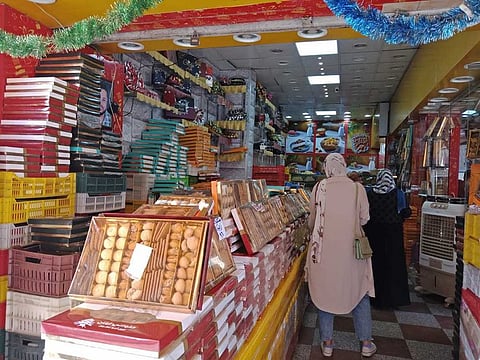Eased COVID-19 curbs boost Egyptians’ Eid joy
Festive cookies give celebrants a sweet taste

Cairo: Hobbled by COVID-19 fears and induced restrictions over the past two years, many Egyptians relied on Zoom, other apps and phone to exchange greetings on the Muslim Eid Al-Fitr feast, which marks the end of the fasting month of Ramadan. This, it seems, is no longer the case.
A marked decline in infection rates in this country of around 103 million people has recently prompted the government to largely loosen anti-coronavirus curbs, bringing the usual hustle and bustle to the nation’s streets and stores.
“After two grim years, our business is brisk again,” said Hany Abdul Azzim, an employee at a Cairo shop selling khak or cookies long associated with Eid Al Fitr in Egypt.
“In the last week of Ramadan, customers have come to us in person, ordering boxes of khak and biscuits without which the joy of the Eid is not complete,” Abdul Azzim told Gulf News.
The festive cookies are made of a kneaded mixture of flour, yeast, ghee, milk and sugar. The cookies can be plain or stuffed with nuts, Turkish delight or date paste.
The dessert is usually served sprinkled with powdered sugar before served to visitors on Eid.
In Egypt, Eid Al Fitr is nicknamed the “Eid of Khak”, emphasising the popularity of the high-calorie delicacy.
In the run-up to the Eid holiday, pastry shops across Egypt traditionally display a large supply of cookies and other desserts to celebrate the occasion.
“Expecting the high turnout, we have worked around the clock in the days before the Eid to meet the demand, which has soared after the corona[virus] measures were lifted,” said Abdul Azzim with a grin of satisfaction. “We offer our goods at prices that are affordable to all so that everyone will celebrate the Eid.”
Keen to keep the age-old tradition alive, some Egyptian families opt to bake the festive sweets at home.
“During the corona, I did not make khak because we didn’t expect visitors on the Eid,” said Hanem Hamed, a mother of four. “But this year, the situation is different as life is getting back to normal, thank God.”
Hanem said she had bought ingredients of the khak and cooked it in the home gas oven with help from her daughters, a tradition she inherited from her late mother.
“Baking khak at home is cheaper than buying it at shops. Moreover, my grandchildren were happy while watching me cook the Eid sweets in the house,” she added.
Known as khak Al Eid or the cookies of the feast, they are immensely popular with Egyptians - Muslims and Christians.
Historians say cookies date back to the days of ancient Egyptians as drawings on temple walls illustrate.
Egyptian Muslims serve this treat on the three-day Eid Al Fitr holiday. Their Christian compatriots likewise celebrate Christmas and Easter with khak cookies.
Last March, the Egyptian government announced removing several restrictions prompted by the pandemic. Accordingly, authorities approved organising street charity parties, a time-honoured feature of Ramadan in Egypt.
Mosques were also allowed to reopen their annexes where such banquets could be hosted and mourning ceremonies are held.
As part of the eased COVID-19 curbs, daily opening hours of stores, restaurants and coffee shops were extended until 2am and religious lessons were allowed at mosques during Ramadan.
Egypt has recently seen a significant drop in COVID-19 infections amid mass vaccinations. Around 34 million of the targeted segments have been fully vaccinated against COVID-19, Dr Mohammed Taj Eddin, a presidential advisor on health, said in April. Over 2 million people have already received the booster shot.
The Ministry of Awqaf (endowments), which is in charge of mosques in Egypt, meanwhile allowed the Eid prayers in mosques and open-air annexes with worshippers observing anti-virus precautions including the wearing of face masks.
The ministry also permitted reopening of women’s prayer rooms and escorted children to enter.
Traditionally after offering the Eid prayers on the morning of the first day of the feast, Muslims in Egypt would wish each other “Eid Mubarak”.
Some worshippers would distribute sweets and colourful balloons to children in signs of jubilation on the occasion.
Later in the day, families and friends would visit each other to offer greetings on the advent of the Eid.
Children, wearing new clothes, would receive cash gifts, popularly known as Eidiya, from parents and visitors.
“The Eid in Egypt is something different and the secret is in the details,” said Abdul Azzim, the sweets vendor, playing on lyrics of a popular song by celebrated Emirati Hussain Al Jassmi.



